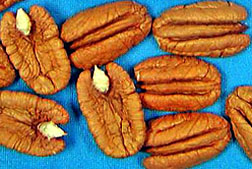This page has been archived and is being provided for reference purposes only. The page is no longer being updated, and therefore, links on the page may be invalid.
|
|
ARS to Release Early-Maturing Pecan
By Dennis O'BrienJuly 21, 2009
When it comes to pecans, timing is crucial. Breeders and retailers prefer pecans that mature quickly because the earlier they hit store shelves each fall, the better they sell.
An Agricultural Research Service (ARS) variety known as Pawnee has been a top seller since its release in 1984 because it is ready for sale by the first part of October, according to Tommy E. Thompson, an ARS pecan breeder and geneticist at the agency's Crop Germplasm Research Unit in College Station, Texas.
But Thompson is releasing a new cultivar this spring that he is confident will beat Pawnee to market each year. Mandan, one of two new pecan cultivars, is bred to mature about a week earlier than Pawnee.
Thompson also is releasing Apalachee, a small pecan bred for baking and manufacturing. But he expects Mandan to be more widely distributed because of its early maturity, nut size and ability to resist scab disease, a fungal pathogen that blackens nuts and can severely damage trees. Growers in Georgia sometimes spray fungicides up to 15 times a year to control scab disease.
ARS has released 28 pecan varieties since 1953, and since 1955 has named them all for Native American tribes, a nod to the nut's status as a North American native, according to Thompson. Pecans grow from Texas and Mexico north to Illinois and east to Georgia, and sales generate $500 million each year.
The new releases are the result of intensive testing that began in the 1980s, when clones were evaluated in greenhouses and planted in orchards for 10 years of screening. Selections that performed best were planted in orchards throughout the Pecan Belt for further evaluations.
In keeping with ARS policies that allow public access to its germplasm and cultivars, Thompson is distributing graftwood free to nurseries and breeders. It usually takes two to three years for nurseries to develop trees ready for sale to homeowners and commercial growers.
ARS is the principal intramural scientific research agency in the U.S. Department of Agriculture.

